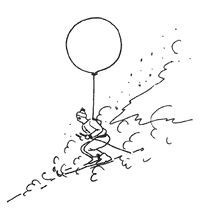STRANGE BUT TRUE- Avalanche advice: Tuck a balloon in your backpack

DRAWING BY DEBORAH DERR McCLINTOCK
Q. How might skiers caught in a downrushing avalanche save themselves by being like a Brazil nut shaken in a container full of peanuts? What must they carry along in order to do this? –A. Lowe
A. With an emergency avalanche balloon in a backpack, a skier caught in flowing snow pulls the triggering rip-cord to inflate the balloon with nitrogen gas from a cylinder, says Jearl Walker in The Flying Circus of Physics. This draws in outside air and provides an upward buoyancy force due to the gas being less dense than the snow. Thus rising near the top of the flow like the Brazil nut in the container, skiers stand a much better chance of survival.
Once an avalanche begins, maximum speed is for particles somewhat above the slope but well below the top. The front of an avalanche might move as fast as 100 meters per second (225 mph); the height might be as much as 100 meters (330 ft). As the snow (especially if powdery) becomes airborne, the concentration of particles is diluted, the saving grace for those ballooned skiers.
Q. Our little 3-pound brains take millions of "snapshots," recording sounds, smells, tastes, time sequences, a continuous running commentary– all day, every day. You'd think overload would set in. –S. Freud
A. Maybe, except the brain has a secret: it cheats, says Harvard's Daniel Gilbert in Stumbling on Happiness. Faithful representation like a DVD isn't the way. Ask eyewitnesses "How fast the two cars were going when they collided?" and you'll get a different answer than if you ask, "How fast were the cars going when they smashed into each other?" In other words, the question itself helps shape our answer.
Dozens of experiments show that our brains more "reweave" experiences than "retrieve" them. Information acquired after an event can alter memory of the event. There's an economy to this as we recall the gist, then fill in the details later, possibly changing them with each retelling.
For instance, we'll store in memory "Went to dinner last week; it was disappointing," along with a few standout features: tough steak, corked wine, snotty waiter. Then when recalling the experience, we'll quickly reweave the "story" by fabricating much of it. "This happens so quickly and effortlessly we have the illusion that the entire thing was in our heads the entire time," Gilbert says.
Q. In the spirit of the John Lennon song, "Imagine," the Olympic Games taken to their most idealistic. –Y. Ono
A. They would stress cross-cultural understanding, deemphasizing nationalism and commercialism, says Robert B. Woods in Social Issues in Sports (drawing on Bruce Kidd). Athletes would compete as "global citizens," with national uniforms, flags and anthems eliminated. Sponsorship money and TV airtime would be used to promote world harmoney via healthy bodies and minds.
Another idea/ideal: "floating Olympic stadiums," already technically feasible, to be built inexpensively on "floating modules" and shipped to locations other than just the wealthiest nations (proposed by architect Michael Burt of the Israel Institute of Technology). This would help prevent the "Sydney Olympic blues," with costly villages and facilities left standing as ghost towns. Instead of being economics-driven, the Olympics would serve as a communal engine for the betterment of humankind. Make that a gold medal for us all!
Q. For a mathematical argument for believing in God, one of the best is Blaise Pascal's famous 17th century "Wager." Recount this dicey heavenly proposition by the father of probability theory. –D. Poist
A. As it is told, Pascal was riding in a carriage one day when the horses bolted, plunging the rig pell mell along a dangerous road and embankment. The brilliant scientist and mathematician believed he was a sure goner, until suddenly, "miraculously" the traces broke, freeing the horses and allowing the carriage to come to a stop.
Pascal believed this to be a sign from above and underwent a religious conversion, prompting him to formulate his Wager: Is belief in God a reasonable course for a rational person? He had already formulated Expectation Theory, which says the value of any bet to the bettor equals "the chance of winning times the worth of the prize." For instance, a 50-50 coin flip which stands to win $10 is a better bet than a 1/6 roll of a die for $25 (because 1/2 x $10 beats 1/6 x $25).
He continued: Is not the reward of heaven and eternal happiness of infinite value? Then whatever the likelihood of "winning," the expectation value of faith is infinite, because infinity times any number, no matter how small, is infinite.
Therefore, faith, to this gambling-minded thinker, was clearly the best bet on Earth.
Send Strange questions to brothers Bill and Rich a [email protected].
#